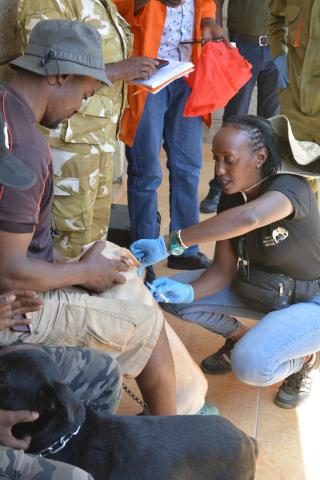KWS and directorate of veterinary services lead mass dog vaccination drive in Kajiado county to combat rabies
Sources: https://www.kws.go.ke/latest-News
Date Published:
latest-News Friday, February 16, 2024 - 14:30
In response to recent incidents of hyena attacks in Juja and Ongata Rongai, Kajiado County, the Kenya Wildlife Service (KWS), in collaboration with the Directorate of Veterinary Services, County Government of Kajiado, has launched a two-day comprehensive mass vaccination campaign targeting dogs in high-risk areas. This initiative aims to curb the spread of rabies, a deadly viral disease that poses a significant threat to both human and wildlife populations.
The recent upsurge in human-hyena conflicts in Juja and Ongata Rongai has raised serious concerns regarding public safety and wildlife conservation. Several incidents have been reported in which individuals were attacked by hyenas, and subsequent investigations revealed that the hyenas tested positive for rabies. This alarming discovery stresses the urgent need for proactive measures to control the spread of this disease.
Studies have shown that domestic dogs play a significant role in the transmission of rabies to humans and wildlife in East Africa. It is estimated that up to 98% of human rabies cases in the region are caused by dog bites. Furthermore, interactions between domestic dogs and wildlife such as hyenas can facilitate the spread of the virus, leading to devastating consequences for both populations.
Recognizing the critical role of vaccination in preventing rabies outbreaks, KWS and the Kajiado County Directorate of Veterinary Services launched a targeted vaccination campaign in Ongata Rongai, Kajiado North Sub-County Division, and Loosirkan, Kajiado East Sub-County Division on 15th, February, 2024. The exercise continued in Ngoroi and Ole Kasasi areas on Friday, 16th February, 2024. The campaign aims to vaccinate as many dogs as possible in these high-risk areas, to ensure that they are adequately protected against rabies.
Mass vaccination of dogs has proven to be highly effective in reducing incidents of rabies and preventing its transmission to humans and wildlife. By vaccinating a significant portion of the dog population, the risk of rabies spill-over to humans and wildlife can be significantly reduced. This not only protects human health but also contributes to the conservation of endangered species by minimizing the threat of disease transmission.
In addition to vaccination efforts, community engagement and education play a crucial role in raising awareness of the importance of responsible pet ownership and rabies prevention. Public outreach programs are being conducted to educate communities on the signs and symptoms of rabies, the importance of timely vaccination of pets, and proper measures to prevent encounters between domestic dogs and wildlife.

